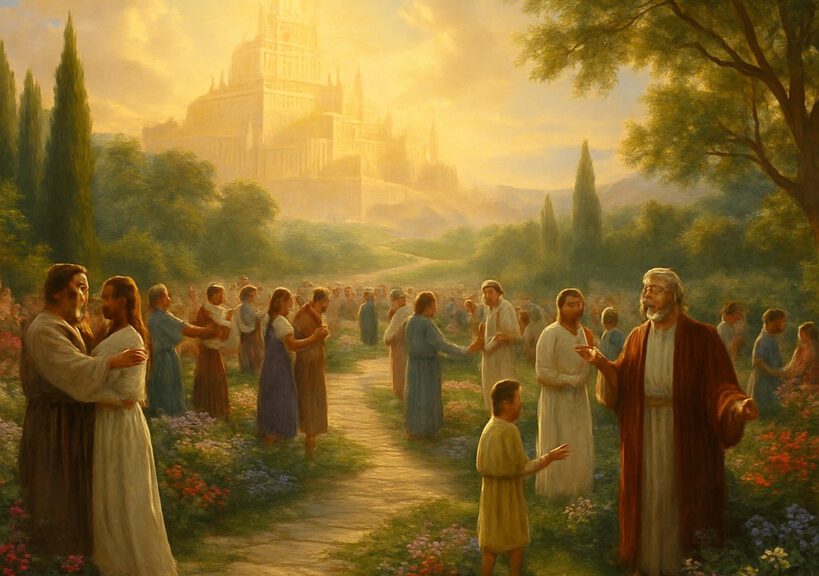Peace through a revolution of giving
Deutsch
1. Introduction:
The world at a crossroads
Is the end of the world nigh once again?
Many people feel that something has fundamentally gone out of balance. The challenges we face – whether social inequality, environmental destruction or the increasing division of society – seem to be becoming ever more pressing. Yet despite all the discussions and political debates, there is a lack of viable solutions that could show us a way out of this crisis. Parties of the left and centre often rely on ‘powering on’, while those on the right lure with supposed alternatives that offer no real answers. Society is drifting apart, and the search for real solutions often remains unsuccessful.
2. The real cause of global problems: the economy or
the financial system?
Actually, it should be the case that the economy produces exactly what people need. That would be the role of the economy. When many people are born, more needs to be produced for a while. But when the demand is met, the economy can rest. Of course, if certain production steps are automated, fewer people are needed to work. That would be the normal case for an economy.
But why isn’t it like that? It’s not that easy to find out, but if you think about it a bit, you can work out the reasons. About 300 years ago, a man called Adam Smith invented competition. Goods were given flexible prices, also known as their exchange value. Someone who could produce cheaper could sell more. This boosted the productivity of the economy. It also brought about great progress.
3. The solution: an economy
without a financial system
Work today: a means of survival
In today’s world, the primary purpose of work is to make a living. People work not out of joy or purpose, but out of the necessity to earn money. They get up every morning to go to work not because they love their jobs, but because they need to pay their bills and feed their families.
This form of work is not God-given. It is a product of the financial system that keeps people dependent and forces them to spend their time and energy on things that have nothing to do with what God created them for, because God gave each person a very specific talent. Work today is just a means of survival, a compulsion that alienates people from their true potential and calling.
4. The transition:
A ‘Worldwide Day of Giving’
The transition to a non-financial system, to a “Benharmonia”, could be achieved by declaring a ‘Worldwide Day of Giving’. On this day, people would continue to work, but in the future they would renounce their wages. As a result, the goods and services produced would no longer have a monetary value and the financial system would become obsolete.
The Church could play a central role in organising and spiritually guiding this transition. A major Church festival such as Easter, Pentecost or Christmas would be the perfect time to observe this day and give it a deeply symbolic meaning.
5. The role of the church:
From word to action
The church has the moral authority and global reach to make this vision a reality. It can spread the idea of volunteering and Worldwide Day of Giving in its sermons, writings and social media. It can call on people to participate in this historic transition.
The church can also provide theological justifications for this transition by referring to the teachings of Jesus, the Jubilee and the encyclical Laudato Si. The parable of the labourers in the vineyard shows that justice does not mean rewarding everyone according to their effort, but according to their needs. Similarly, the jubilee year (Leviticus 25) illustrates how property can be redistributed to reduce social inequality. These principles could help us to shape a society that is characterised not by competition but by cooperation.
It can emphasise that this step is an act of faith and hope for a better future.
The church can act as a global network to coordinate the transition and ensure that all regions of the world participate equally. It can mobilise local communities to organise the transition at the community level and ensure that no one is left behind.
6. The new society:
The kingdom of God on earth
In a world without a financial system, we would live in a society based on solidarity, justice, and charity. People would help each other as in a large family, and the exploitation of natural resources would end. All people would have access to the resources they need to live with dignity.
This society would be the kingdom of God on earth—a world where the values of the gospel become reality. It would be a world where people are no longer dominated by material constraints but can live in freedom and dignity. In this society, Jesus Christ could truly be among us. He will ensure that this economy of mutual giving, the “Benharmonia”, will function permanently.
7. Epilogue: A call to action
The world is on the brink of disaster, and we have no time to lose. The Church has the chance to play a central role in shaping a new, fairer society. It can give people hope and call on them to join together in forging a path to a future based on solidarity, justice and charity.
The vision of an economy without a financial system is more than a utopia – it is a necessary step towards a better future. It is up to us to take this step and change the world. The church can show the way and call on people to work together to realise the Kingdom of God on earth.
May the Holy Spirit give us the strength and courage to walk this path – a path that brings us closer to God and to one another. Amen.
Berlin, 4 January 2025
Eberhard Licht
